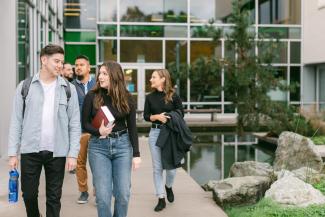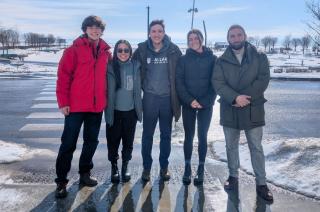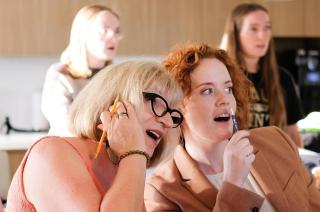Indigenous laws, Indigenous perspectives on colonial law and community

Allard Law
Jun 16, 2023

Most students who consider applying to law school will likely have heard that first-year law is no walk in the park.
The difficulties of first-year law are amplified for Indigenous students. While nearly five per cent of Canada’s population is Indigenous, Indigenous lawyers make up less than three per cent of the BC bar. Indigenous people are over-represented in Canadian jails, and Canada’s legal system is often in conflict with Indigenous laws and practices. Historical and cultural factors exacerbate these realities, and Indigenous students interested in a career in law are faced with hurdles that non-Indigenous groups aren’t likely to experience.
As Allard Law student Sarah Chetney puts it, “discussing topics like residential schools, the child welfare system, and the over-incarceration of Indigenous peoples is not simply an academic exercise for Indigenous students. Instead, these discussions are deeply personal and traumatic due to our personal and intergenerational experiences.”
At Allard Law, the ILS Summer Intensive began as a two-week introductory course in 2020, in response to the cancellation – due to COVID – of the University of Saskatchewan’s summer program for incoming first-year Indigenous law students. In 2021, an expanded and credited seven-week ILS Summer Intensive in Tort Law course was developed and offered to incoming Indigenous JD students, and again in 2022.
Professor Anne Uteck is faculty lead and instructor for the ILS Summer Intensive in Torts. “Community building is one of the primary objectives of the course,” she says. “It helps students build relationships with each other, and provides support, guidance and a sense of community throughout their time at Allard.”
“The course helped me overcome the impostor syndrome by helping me interpret the language of law,” says Allard Law student Vanessa Rosteski. “As I grew more comfortable with reading cases and engaging with the material, I realized that there was no mistake and I am right where I am meant to be.”
Allard Law student Gabe George, who completed the Intensive in 2021, reflects on the sense of disconnectedness many Indigenous students feel in law school: “Indigenous students know they belong at Allard because they’re part of a broader community. For some it’s hard to connect with their non-Indigenous classmates, so having that peer network is essential.”
As well as establishing a strong sense of community, the ILS Summer Intensive is academically rigorous. Students not only learn the substantive law, but also how to read cases, identify legal issues, develop legal reasoning tools, conduct research and write law exams. Says law student and 2022 Spirit Award recipient Vaughn Beaulieu-Mercredi, “The course taught me to pull legal principles from cases, how to write in a legal way, what to expect on an exam, and how to read fact patterns, among other things.”
During the course, students attend lectures, workshops, panels, cultural activities and talking circles, and have opportunities to interact with peers, second and third-year students, faculty and staff, and Indigenous members of the bar and judicial system. Provincial Court Judge Alexander Wolf participates each year, giving students insights into not only the ins and outs of the judicial process but also the challenges faced by Indigenous peoples in all aspects of the law. “Colonialism is a simple creation that did not include the Indigenous voice,” he says. “I’m proud that law schools are actively ensuring that our law societies become more inclusive. I’m particularly proud that Indigenous peoples are stepping up to take that leap of faith, apply to law school, become lawyers and judges.”
The Summer Intensive embeds traditional Indigenous legal practices within the course and “weaves Indigenous perspectives throughout the curriculum,” says Uteck, “taking up the challenge of critically examining assumptions that underpin the common law and engaging with Indigenous legal traditions and lived experiences to inform the study of tort law.” While it’s difficult to assess the success of the ILS Summer Intensive – its participants have yet to graduate – there is anecdotal evidence that the course has done its job, and that the sense of purpose instilled in these students will guide their careers in the law.
Lee Schmidt (LLB ’02), Associate Director, Indigenous Legal Studies, and staff lead for the ILS Summer Intensive, has championed the course since its inception – advising incoming students, securing financial support, creating mentorship initiatives and developing Indigenous programming to strengthen the course objectives.
“It seems that students who have been through the course are more confident, more inquisitive, and have a better sense of how the system works. They’re not intimidated by the rigours of first year. They feel like they’re part of the academy. And, it creates a sense of community of learners in what is a challenging, stressful program,” says Schmidt.
The impact of the summer intensive is felt throughout the law school experience and, one hopes, beyond. Seminars, courses and social and scholarly events are held for Indigenous students year-round, which, as Schmidt says, “helps to deal with the perception that the law works against Indigenous people, but rather that we can have a hand in changing that.”
Or, as Judge Wolf puts it, “When we look back in 40 years’ time, and ask ourselves, ‘Did more Indigenous legal professionals make a difference in the Canadian judicial system?’ ‘Absolutely’ will be the answer.”
The Allard School of Law is grateful to the many individuals and sponsors who have supported the ILS Summer Intensive.
This article was originally featured in the 2023 Allard Law alumni magazine. Last updated June 16, 2023.
- Allard School of Law
- Indigenous Legal Studies


